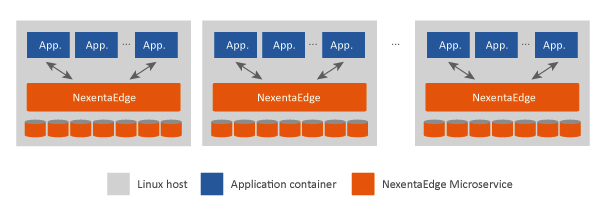Nexenta Brings Enterprise and Cloud Grade Storage and Data Management to Container-Based Cloud-Native Application
Tighter collaboration with Linux Foundation, Open Container Initiative and Cloud Native Computing Foundation
This is a Press Release edited by StorageNewsletter.com on September 21, 2015 at 2:50 pmNexenta Systems, Inc. announced its plan and strategy for bringing enterprise and cloud grade storage and data management to container-based cloud-native application deployments.
Nexenta is integrating container technology with its scale-out NexentaEdge software-defined storage solution, embracing microservice architectures to provide a high performance, enterprise-grade storage foundation for cloud-native applications.
The agility, simplicity and efficiency of microservices and container-based architecture have established them as the de facto standard for developers building cloud applications at scale. This is particularly true for stateless applications that require little or no persistent storage capability from the infrastructure. As enterprises look for ways to bring these same agility, simplicity and efficiency benefits to stateful applications, the need for persistent storage solutions that tightly integrate with, and seamlessly support container deployments has developed and come to the forefront.
Nexenta is working with its partners to address these emerging requirements with its open software-defined storage solutions, enabling customers to simply deploy cloud-native applications whether they require persistent storage or not. In the process, Nexenta is enabling true software-defined container-converged infrastructure: scale-out server based infrastructure that concurrently runs NexentaEdge storage microservices and application microservices, providing high performance persistent storage services and simple container mobility.
Nexenta’s portfolio of OpenSDS solutions provides a foundation for agile container-based infrastructure.
As part of this initiative, Nexenta is:
- Joining the Open Container Initiative (OCI) and Cloud Native Computing Foundation (CNCF). Other members include: Apcera, AT&T, AWS, Cisco, ClusterHQ, CoreOS, Datera, Docker, EMC, Fujitsu, Google, Goldman Sachs, HP, Huawei, IBM, Intel, Joyent, Kismatic, Kyup, the Linux Foundation, Mesosphere, Microsoft, Midokura, Nutanix, Oracle, Pivotal, Polyverse, Rancher, Red Hat, Resin.io, Suse, Sysdig, Twitter, Verizon, VMware
- Integrating container technology into NexentaEdge, enabling NexentaEdge nodes to be deployed as microservices on any scale-out cluster of Linux servers, providing high performance block and object storage services with enterprise grade functionality (inline deduplication, inline compression, unlimited snapshots, clones, etc.)
- Enabling low latency data access between application microservices and NexentaEdge storage microservices running concurrently on the same server infrastructure, eliminating the overhead associated with traditional iSCSI block access methods and delivering true container-converged infrastructure
- Delivering unlimited container mobility across the entire cluster by leveraging NexentaEdge scale out architecture for any time, any server access to any container image or any application backend data
- Ensuring seamless integration and management of NexentaEdge storage microservices with Kubernetes
- Building ClusterHQ Flocker volume plug-ins for NexentaEdge and NexentaStor to support customers who prefer to keep compute and storage running on separate physical infrastructure
- Compatibility with Canonical’s Juju, Charms and LXD
“Containers and microservice architectures have changed the way new applications are developed, deployed and managed at scale. At Nexenta, we’re focusing on the next stage of infrastructure evolution, building software-defined storage management for containers and enabling seamless stateful container mobility on truly container-converged infrastructure. NexentaEdge is a natural fit for enabling these new architectures,” said Thomas Cornely, chief product officer, Nexenta.
“Containers are revolutionising the computing industry and delivering on the dream of application portability,” said Jim Zemlin, executive director, the Linux Foundationwww.linuxfoundation.org. “We applaud Nexenta’s vision for making software defined storage a critical part of OCI and CNCF and the next generation of cloud applications.”
“Canonical has invested in bringing container technology to the masses for the last five years, and with LXC and LXD we are now delivering infrastructure which makes containers as simple and familiar to provision as legacy VMs,” said Christian Reis, VP of hyperscale computing, Canonical Ltd. “Nexenta’s vision for storage with containers fully aligns with ours, and we are pleased to have them commit to using Juju and LXD as underlying technologies for container-based NexentaEdge deployments on Ubuntu.”
“The integration of Flocker with NexentaEdge and NexentaStor is bringing enterprise-grade storage and data management to container based cloud native application deployments. We’re pleased to have Nexenta join ClusterHQ’s growing partner network to increase storage options for customers interested in building stateful microservices on Docker,” said Mark Davis, CEO, ClusterHQ.
“Rancher is pioneering how Docker will be implemented in the enterprise by helping organisations build private container services that run on any infrastructure,” said Sheng Liang, Rancher Labs CEO. “A big part of that transformation will be around the adoption of software defined storage for containers. We’re excited to work with Nexenta to incorporate their software defined storage technology into Convoy, our recently announced open source storage driver for Docker.”
“Nexenta’s integration with containers expands the choice of storage platforms for enterprise customers looking to deploy containers which require data persistence. We look forward to new innovations from ecosystem partners like Nexenta and working with them on VMware’s container initiatives,” said Kit Colbert, VP and CTO, cloud-native apps, VMware, Inc.














 Subscribe to our free daily newsletter
Subscribe to our free daily newsletter

